A cure for diabetes, food made from CO2 and a wound dressing that kills superbugs are all a step closer to reality thanks to these 10 spinouts.

AdipoPharma

France-based AdipoPharma isn’t content trying to treat the symptoms of type 2 diabetes, it wants to tackle the root cause of the disease — insulin resistance. It does this by restoring insulin signalling in adipocytes (fat cells), which also restores healthy lipid biosynthesis.
Vincent Marion, the deputy director of the Laboratory of Medical Genetics in Strasbourg at INSERM, began work on the drug candidate PATAS, the first of what the company anticipates will be a class of drugs called adipeutics, through research into Alström syndrome, an ultra-rare disease that causes severe insulin resistance, early-onset type 2 diabetes and associated metabolic dysfunctions. Through that decade-long work, he developed a detailed analysis of adipocytes’ complex function.
PATAS is set to enter clinical trials this year. AdipoPharma has opened a US office in Pittsburgh in anticipation of these studies, and the spinout has picked up an undisclosed amount of series A funding from Newton Biocapital and Good Growth Capital.
Longer term, AdipoPharma has set its sights on adipeutics that would treat non-alcoholic fatty liver disease, cardiovascular disorders, fibrosis and other metabolic disorders.
AI Sight
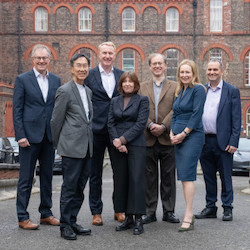
Let’s stay on the topic of diabetes for a moment. One of the potential complications of the disease is diabetic retinopathy, where high sugar levels damage the retina, leading to blindness if left untreated. So, catching the disease at an early enough stage is crucial.
But there are more than 500 million people living with diabetes — nearly everyone with type 1 develops diabetic retinopathy and 21% of those with type 2 already suffer from the complication when they’re first diagnosed with diabetes.
AI Sight, a UK-based spinout of University of Liverpool, launched earlier this month aiming to tackle a serious challenge surrounding the diagnosis of the complication: scarce medical resources.
The spinout’s platform combines human expertise with artificial intelligence to analyse retinal images across disease severity and treatment intervention points. The AI has been trained on 1.6 million images to date. The platform can interpret images from any retinal camera.
The university has invested an undisclosed sum through its Enterprise Investment Fund. AI Sight is actively raising a series A round.
Amferia
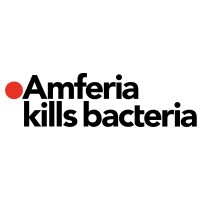
Antimicrobial resistance is a serious threat to human health. A wound dressing that kills bacteria, including superbugs, would be revolutionary.
Amferia, a Sweden-based spinout of Chalmers University of Technology, has developed a hydrogel that can be applied to anything from simple wounds to post-operative and trauma wounds.
The spinout’s technology encases antimicrobial peptides in a solid gel that protects them for up to five days (the poor stability of peptides was previously a challenge), leaving free only the part that can bind to and puncture bacterial cells. In other words, the killing of bacteria is a physical, not a chemical, process, so even superbugs are vulnerable and there’s a very low risk of bacteria developing resistance.
The hydrogel targets only bacteria and is non-toxic to human and animal health. Wound dressing for animal care is where the spinout is releasing its first product, but it plans to release products for humans in future.
To do all of that, Amferia picked up SEK15.4m ($1.5m) from Chalmers Ventures, Almi Invest and multiple angel investors at the end of last month.
Arkeon

What if you could turn carbon dioxide into food? It sounds impossible, but that’s what Austria-based Arkeon is doing. The company uses a one-step fermentation process that uses single-celled organisms called archaea which consume CO2 in a bioreactor containing a simple salt solution and hydrogen.
Arkeon produces complete mixtures of amino acids, the building blocks of proteins. The entire process is carbon negative.
The company was founded in 2021, building on a decade of research by CEO Gregor Tegl, chief technology officer Günther Bochmann (a researcher at University of Natural Resources and Life Sciences, Vienna, also known as BOKU) and chief scientific officer Simon Rittmann (a principal investigator at University of Vienna).
Speciality minerals company ICL led a €4m ($4.3m) round — consisting of SAFE notes — through its agrifood innovation and investment platform, ICL Planet Startup Hub, last month.
Celadore
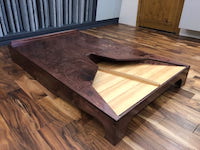
Cello music might not evoke images of innovation, but James Tagg, associate professor of music at Indiana University, is proving that inventions don’t always have to come from the sciences.
US-based Celadore is working on an acoustically optimised podium that harnesses the vibration of the cello’s endpin to improve the instrument’s sound. The invention has been patented through the university’s Innovation and Commercialization Office.
It’s still very early days. Tagg secured a $20,000 pre-seed award at the Elevate Nexus Southern Region Pitch Competition and $2,500 from The Mill’s Flywheel Fund. He will use the money to create a version of his prototype that can be more easily manufactured and will incorporate feedback from musicians.
Dxcover

Scotland-based Dxcover (known as ClinSpec Diagnostics until 2021) was spun out of University of Strathclyde three years ago and since then has completed two clinical studies — with promising results.
The spinout analyses blood samples using infrared spectroscopy and machine learning algorithms to detect the presence or absence of brain or colorectal cancers. The company expects to expand into other indications, too.
Dxcover has raised some £14.6m ($17.6m) in equity and grant financing to date, most recently picking up £7.5m in series A funding from the university as well as Eos Advisory, Mercia Asset Management, Scottish Enterprise, SIS Venture, Norcliffe Capital and Mark Bamforth.
Dxcover is actively building out its US presence and previously stated it was looking to generate £25m in its series A round.
Endevica Bio
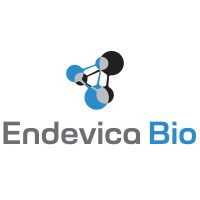
Cachexia is a condition faced by patients living with diseases such as cancer that causes weight loss even if they consume normal amounts of food. It’s also called wasting syndrome, because there’s a loss of muscle and fat, it leads to fatigue and reduced quality of life and, in the worst case, multiple organ failure.
Science still hasn’t fully figured out what exactly happens in cachexia. But US-based Endevica Bio hopes its first-in-class peptide drug candidate, TCMB07, can offer relief by crossing the blood-brain barrier to reach previously inaccessible target receptors.
Endevica Bio was founded by chief scientific officer Kenneth Gruber, a former National Institutes of Health Branch Chief and an adjunct professor at University of Missouri.
The company recently obtained $10m in a series B round and it has released promising results from the single ascending dose part of its phase 1 clinical trial. It’s set to release results from the multiple ascending dose, concluded at the end of last year, soon.
MagREEsource
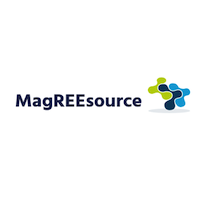
Rare-earth elements are critical components of a vast array of modern-day applications thanks to their importance in manufacturing permanent magnets (meaning they’re used in everything from hard drives to electric vehicles to MRI scanners). They’re not “rare” in the sense that there aren’t a lot of them on earth (there are), but in the sense that economically exploitable deposits are sparse — hence why the world has been so dependent on mines in China and why news of large deposits in Sweden last month was so newsworthy.
Besides the geopolitical implications of having to rely on Chinese suppliers, rare earth mining is incredibly destructive to the environment and it takes a disproportionate amount of resources to extract ore deposits.
France-based MagREEsource hopes to solve this challenge by recycling permanent magnets. That seems an obvious solution, but currently, only around 1% (yes, one percent) of rare earth metals are recycled.
MagREEsource, building on 25 years of research at Institut Néel and established with support from regional tech transfer organisation SATT Linksium, uses a hydrogenation process that requires no acid or solvents.
The company raised €5m ($5.4m) from SATT Linksium as well as Finindus, Tangent Line, EIT RawMaterials, Ciech Ventures, BAdGE and Grenoble Angels last month and will open a 50-ton-per-year pilot facility in the second half of the year. Its longer-term plan is to open a 500-ton-per-year plant in 2027.
Membrion

Industrial wastewater is not always treated on site — even today, it is sometimes pumped into tanks and trucked somewhere else. It’s incredibly inefficient and expensive. And that’s before you consider just how water-intensive some industries are.
Membrion, a US-based spinout of University of Washington, has developed a ceramic desalination membrane that can filter and purify up to 98% of water on site — even if the water is so contaminated that it would destroy other membranes on the market.
Membrion’s technology relies on a silica gel — the idea came from the little moisture absorption packets you find in some food packages — and the membranes are low fouling so require fewer cleanings than others on the market.
The spinout most recently picked up $7m in a series B round led by PureTerra Ventures, with contributions from Safar Partners, GiantLeap Capital, Freeflow and existing investors (they were unnamed, but university-linked WRF Capital and e-commerce and internet group Amazon had taken part in a $9m series A round closed in September 2021).
Pilar
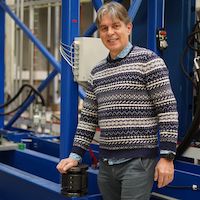
It’s well known that concrete has an enormous carbon footprint but demand for the material is rising steeply. Companies are trying to produce more environmentally friendly concrete but what if we could avoid the material altogether in more scenarios?
Screw piles are an established method of building foundations that replace concrete, but their applications have been largely limited to prefabricated houses and small projects like sheds. The limitation is due to a lack of standardised models to calculate the bearing capacity of screw piles — so using them for larger buildings would mean a costly and inefficient process of figuring out how many and where exactly to install them.
Pilar, a Denmark-based spinout of Aalborg University, has developed a device and cloud-based software that handles these calculations and provides building code documentation. It says using its technology, screw pile foundations can be installed within a day.
The spinout was co-founded by Prof Lars Bo Ibsen, as well as Mikkel Ibsen and Anders Ellern Bilgrau. Screw pile manufacturer Bayo’s International and Andreasen & Hvidberg, which offers geotechnical investigations and accreditation of screw pile foundations, are also part of the founding consortium that came together as a result of an Innovation Fund Denmark Grand Solution project.
Disclaimer: This list is for informational purposes only. It does not constitute investment advice.









